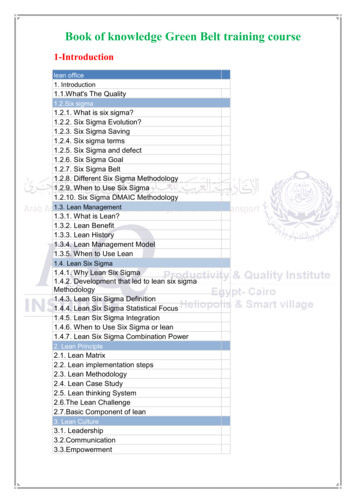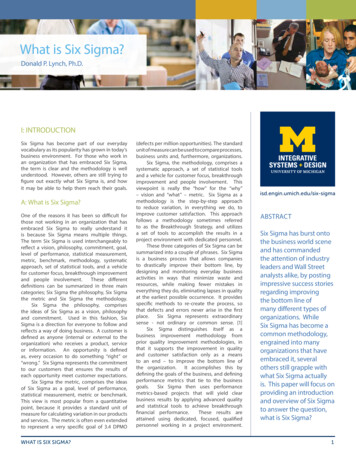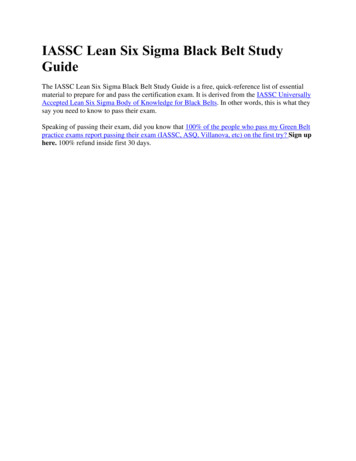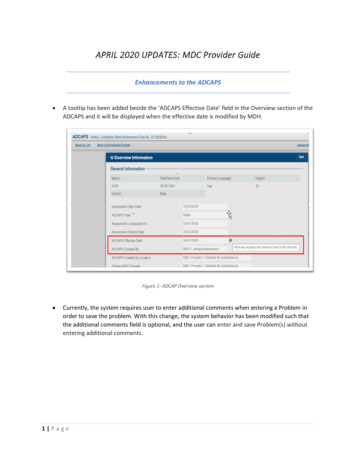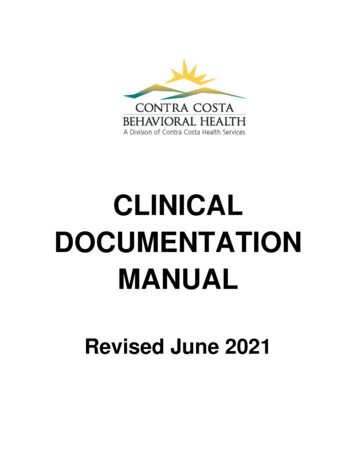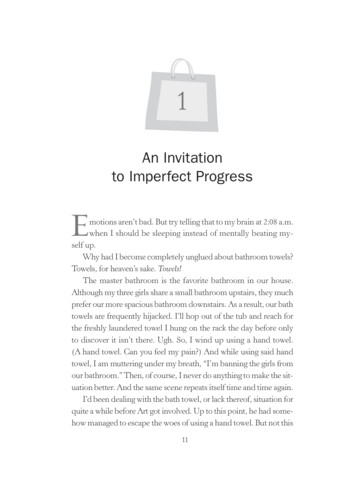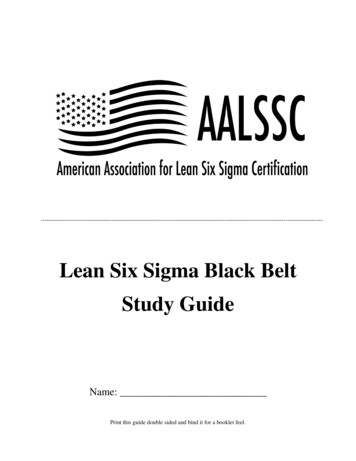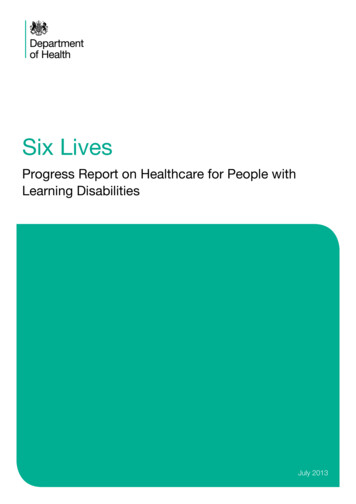
Transcription
Six LivesProgress Report on Healthcare for People withLearning DisabilitiesJuly 2013
Six Lives:Progress Report on Healthcare forPeople with Learning Disabilities
Contents1ContentsForeword by the Minister for Care and Support2Easy read summary4Introduction21PART ONE – Progress since 201026Section 1: Progress on the Department of Health’s four 2010 priorities28Section 2: Progress on the Department of Health’s wider 2010 commitments40Section 3: Progress on other areas people with learning disabilities were worried about47Section 4: Areas identified for further progress56PART TWO – Progress and changes in the Regulatory Framework since 201058PART THREE – New developments and new responsibilities since 201061Section 5: The new health and care system62Section 6: Other key developments68Conclusions and next steps72Annex A: Ombudsmen’s 2009 recommendations75Annex B: Learning Disability Public Health Observatory publications76Annex C: DH Outcomes Frameworks79References81
2Six Lives: Progress Report on Healthcare for People with Learning DisabilitiesForeword by the Minister forCare and SupportIt has been six years since Mencap’s original report, Death by Indifference, shocked us allwith its exposure of the unequal healthcare and institutional discrimination that people withlearning disabilities can experience within the NHS. The report described the harrowingcircumstances surrounding the deaths of six people with learning disabilities, people whodied while in the care of the NHS.While much has improved since then, we know there is still more that needs to be done toachieve the changes to the culture of care and compassion that we all want to see for peoplewith learning disabilities.Nowhere is the need to transform that culture, particularly for more vulnerable patients, moreclearly demonstrated than by the shocking events at Winterbourne View Hospital. Our recentConfidential Inquiry into the premature deaths of people with learning disabilities report alsoshowed that people with learning disabilities continue to have poor experiences andoutcomes compared with people without learning disabilities.We have learned from these that healthcare can still fall far short of the standards of care thatwe would expect our health and social care system to deliver. The events that occurred atWinterbourne View pointed not just to one rogue institution but also exposed widespread,systemic failings. For too long and in too many cases people with learning disabilities havereceived poor quality and inappropriate care.So what are we doing about it?We established and funded the Confidential Inquiry from April 2010 to March 2013 and noware working with NHS England, Public Health England and other partners on the Inquiry’srecommendations. We have published our response to the recommendations alongsidethis report.We have made safeguarding vulnerable people a key priority for NHS England. One of NHSEngland’s objectives is to ensure that vulnerable people, particularly those with learningdisability and autism, receive safe and appropriate high-quality care.We will hold the NHS to account for the quality of services for people with learning disabilitiesthrough the NHS Outcomes Framework. This framework is meant to focus the NHS onimproving outcomes for patients. One of the outcomes in this framework is to reducepremature mortality in people with learning disabilities.The NHS is also taking steps to ensure that people with learning disabilities have exactly thesame rights as anyone else. NHS England has a specific legal duty to tackle inequality and
Foreword by the Minister for Care and Support 3advance equality, particularly for people who experience poor outcomes compared with thegeneral population.Public Health England’s (PHE) priorities for 2013/14 include a focus on reducing prematuremortality and on making nationally visible the health needs of those on the margins andotherwise overlooked. The Learning Disability Public Health Observatory is now establishedwithin Public Health England to provide high-quality data on learning disability.We are taking steps to improve services for people with learning disabilities or autism andmental health issues or behaviour that challenges. People with learning disabilities or autism,who also have mental health conditions or behaviour that challenges, have a right to accessthe support and care they need in the community, near to family and friends. In line with ourcommitments outlined in Transforming Care, the Department of Health report into the Reviewof Winterbourne View Hospital, local health commissioners have developed their registers ofpeople with learning disabilities and people’s care plans should all have been reviewed.Details of actions taken by local commissioners in meeting this obligation will be published.As a result, anyone inappropriately in hospital will move to community-based support asquickly as possible.Winterbourne View revealed weaknesses in the system’s ability to hold the leaders of careorganisations to account. We are tackling this gap in the care regulatory framework. The CareQuality Commission (CQC) is strengthening inspections and regulation of hospitals and carehomes. This includes unannounced inspections involving people who use services and theirfamilies. CQC now includes reference to the best model of care in its guidance.Every year more people are receiving an annual learning disability health check. This helps toidentify a range of health needs and can allow people to access appropriate investigationsand treatments for health conditions.This report, the second of two progress reports that the Department has published at therequest of the Local Government and Health Ombudsmen since the original Six Lives reportwas published in 2009, charts the progress that has been made in healthcare for people witha learning disability since 2010. Most importantly, it includes the very personal perspectives ofpeople with learning disabilities and their families. They have been frank and fair with us,detailing both their positive and negative experiences of care. They have told us, loud andclear, that although there have been improvements, a lot more needs to be done to ensurethat people are treated with the compassion and dignity that is their right, and that theyreceive the same quality of care and treatment as anyone else.These fundamental messages need to be heard by everyone who works in the health andsocial care system, from Government to front-line staff, and we should all consider how werise to this challenge.Norman LambMinister for Care and Support
4Six Lives: Progress Report on Healthcare for People with Learning DisabilitiesEasy read summary This is a report from the Department ofHealth for the Parliamentary and HealthService Ombudsman and the LocalGovernment Ombudsman. The report says what has happened sincethe Department of Health wrote the firstprogress report on ‘Six Lives’ in 2010. If you would like to see the easy read of the2010 report click on this link:www.gov.uk/government/publications/reportThe Health Service Ombudsman has thepower to look into complaints people makeabout the NHS.The Local Government Ombudsman hasthe power to look at complaints aboutlocal councils.‘Six Lives’ was the Ombudsmen’s reportlooking at the care given to six people withlearning disabilities who died. ‘Six Lives’ waspublished in March 2009.
Easy read summary 5This second report says what has happened tomake things better for people with learningdisabilities since the Department of Health’s‘Six Lives’ progress report in October 2010.Who we asked about what had happened since 2010To write this report we asked lots of differentpeople for information about what hashappened since 2010.We asked the following people: People with learning disabilities and theirfamilies. People in health and social careorganisations like NHS England and localcouncils.
6Six Lives: Progress Report on Healthcare for People with Learning Disabilities People who collect information aboutpeople with learning disabilities fromLearning Disability Partnership Boardsand other organisations. Charities like Mencap and the BritishInstitute of Learning Disabilities (BILD) whohelped us with a listening event for peoplewith learning disabilities and family carers totalk about ‘Six Lives’.The Department of Health has published threeother reports which will make a difference topeople with learning disabilities:1. The Francis Inquiry (Report of the MidStaffordshire NHS Foundation Trust PublicInquiry) which looks at putting patients firstand improving the way we listen to them.2. ‘Transforming Care: A national response toWinterbourne View Hospital’.3. A ‘Concordat’ or Agreement which issigned by 50 different organisations to saythey agreed with the actions in the‘Transforming Care’ report and would helpto make them happen.
Easy read summary 7How we have listened to people with learning disabilities andtheir familiesWith the help of BILD and Mencap we askedpeople with learning disabilities and familycarers about their experiences and if things hadgot better. We did this in two ways:1. We held a listening event in April 2013called ‘Is healthcare “Getting Better” forpeople with a learning disability?’, to hearfrom people with a learning disability andtheir families.2. We also carried out a written survey in Aprilto ask questions about what had got betterfor people with learning disabilities and theirfamily carers.What we found out:People described some hospitals and GPpractices as having improved their care andtreatment of people with a learning disability alot in recent years.There are easy read copies of the report of thelistening event and the survey on this -indifference/six-lives-reportThis is what many people told us:
8Six Lives: Progress Report on Healthcare for People with Learning DisabilitiesThings going well in healthcare1. Reasonable adjustments being made.2. Staff having a positive attitude towardspeople with a learning disability.3. Involving people with a learning disabilityand their families/carers.4. Employment of learning disability nurses.5. People in hospitals do what the law says inthe Mental Capacity Act.Things not going well in healthcare1. It takes too long to find out what is wrongwith someone and start treatment.2. Annual health checks are not always doneproperly.3. People with learning disabilities are notgiven information in a way they canunderstand.4. People who work in hospitals do not alwaysrealise when someone is in pain.5. People are not included in decisions abouttheir care.
Easy read summary 9Doing what the Ombudsmen askedThe Ombudsmen read the Department’s 2010progress report and said that it showed goodprogress had been made.The Ombudsmen said there was a lot more todo to make sure health and social care serviceswere good for everyone. he Ombudsmen asked the Department to doTanother progress report to look at:1. How health and social care organisationshave carried on with the good work since2010.2. How good the organisations are that checkservices for people with learning disabilities.These are called the regulators.3. How the big changes the Government hasmade to the health and social care systemwill affect people with learning disabilities.The changes are in the Health and SocialCare Act 2012.The report is in three parts to cover the thingslisted above.
10Six Lives: Progress Report on Healthcare for People with Learning DisabilitiesPART ONE: How health and social care organisations havecarried on with the good work since 2010?We looked at the four most important thingswe reported on in October 2010. These are:1. Getting information from the LearningDisabilities Public Health Observatory.This is an organisation that collectsinformation about people with learningdisabilities and puts it on their website toshare with everyone.We have lots of useful information likePartnership Board reports and annual healthchecks. The Observatory was set up for 3years under ‘Valuing People Now’. It will carryon as part of Government.2. Looking at the results of the ConfidentialInquiry which looked at why people withlearning disabilities died earlier than otherpeople.The Government’s answer to the report on theConfidential Inquiry is being published at thesame time as this report. It shows that peoplewith learning disabilities are still having poorerhealthcare than others. There is an easy readcopy available on this partment[ ] department-ofhealth.
Easy read summary 113. Annual health checks.Every year more people are getting healthchecks. GPs are getting better at makingreasonable adjustments so that it is easier forpeople to have health checks.4. Sharing good practice.Good practice has been included in lots ofreports. For example, the two reports onWinterbourne View.There has been a good practice project as partof Winterbourne View led by the NationalForum of People with Learning Disabilities andthe National Valuing Families Forum. There willbe an easy read report of the project publishedin summer 2013.This report also includes progress since2010 on the following:Health self-assessments reports.Learning Disability Partnership Boardsreports.From 2013 there will be a new report whichputs the health self-assessment and theLearning Disability Partnership Board reportstogether.The new report will cover health and social carefor people with learning disabilities.
12Six Lives: Progress Report on Healthcare for People with Learning DisabilitiesLearning disability liaison nurses inhospitals.We heard from people with a learning disabilityand family carers that liaison nurses made abig difference to how health services workfor them.The Mencap survey showed that not allhospitals had a liaison nurse.The Department of Health will be looking atcollecting numbers of liaison nurses.There has been a big report with informationfrom the whole of the UK about learningdisability nurses. It is called ‘Strengthening theCommitment’. There is a lot of work to do fromthe report.We also looked at other things which peoplesaid they were worried about in 2010:Capacity and consent. This is about peoplebeing able to have a say and agree toimportant decisions like whether to havean operation.The Mencap survey showed that some thingswere better. People were being asked to makedecisions when they are able to. But this didnot always happen.
Easy read summary 13Staff understanding the needs of peoplewith learning disabilities.We have lots of examples of good practice and‘reasonable adjustments’. This meanschanging the way you do things so that peoplewith learning disabilities can take part orunderstand.Advocacy and making complaints. Thismeans giving people the support they need tomake choices about healthcare and makingsure when things go wrong that people arelistened to and changes made.From April 2013, local councils now decideabout NHS advocacy services. They can makethe best decisions for local people.It is very important that people can complain ifcare is not good enough.People at the Mencap listening event said therewere lots of problems about makingcomplaints. It is too soon to say if the newsystem will be better.
14Six Lives: Progress Report on Healthcare for People with Learning DisabilitiesPART TWO: The regulators (government checkers)The regulators – the Care Quality Commission(CQC), Monitor and the Equality and HumanRights Commission (EHRC) – were asked bythe Ombudsmen about their progress since2010.The CQC checks health and care services.Since the 2010 report, the CQC has includedpeople with learning disabilities in theirinspections. They are called ‘experts byexperience’.Monitor check some kinds of NHSorganisations, called Foundation Trusts.Monitor has a checking framework thatincludes learning disability as one of its checks.The EHRC check people’s human rights arebeing respected.There is joint guidance by CQC and EHRC onequality and human rights for CQC inspectors.All three organisations have written to theOmbudsmen to say what they have donesince 2010.They say they are working together to makesure services for people with learningdisabilities meet their needs.
Easy read summary 15PART THREE: Changes to the health and care systemThe Government has made changes tohow health services and social care servicesare organised.The changes are now part of the law. TheHealth and Social Care Act 2012 made all thechanges happen. But they did not happen until1st April 2013.There are new organisations like NHS England,Clinical Commissioning Groups (groups of GPs)and Public Health England.One of NHS England’s jobs is to ensure thatvulnerable people, particularly those withlearning disabilities and autism, receive safe,appropriate, high quality care.The Department of Health is in charge oflooking after the whole health and care systemand making sure that the parts work together.Its job is to help people, including people withlearning disabilities, to live better for longer.The Department leads work for people withlearning disabilities through the LearningDisability Programme Board.The Board is chaired by the Minister for Careand Support, Norman Lamb. People withlearning disabilities and family carers are onthe Board.
16Six Lives: Progress Report on Healthcare for People with Learning DisabilitiesOther things the Department of Health is doing to makethings betterHealth Equality Framework This is a framework that shows what leadsto good health outcomes. It was drawn upby learning disability nurses. This means deciding what leads to somepeople having better health than others, likegood housing and friends in the community. The framework is for people with learningdisabilities and family carers,commissioners and providers to helpdecide what will help give good healthoutcomes.Personal Health Budgets Personal Health Budgets are like personalbudgets in social care. They give peoplemore choice and control over their health. Everyone receiving fully funded ContinuingHealth Care will be offered a PersonalHealth Budget by 2014.
Easy read summary 17Safeguarding A new piece of law called the Care Bill isbeing discussed in Parliament. If itbecomes law then every local council mustset up a Safeguarding Adults Board. The Bill says that if councils think an adultwith care and support needs is at risk ofharm then they must consider what actionis needed. This will keep people saferincluding people with learning disabilities.Conclusion and next stepsThere are messages in this report forgovernment, commissioners and providers.The Government will keep listening to the viewsof people with learning disabilities and theirfamilies to make more changes to improve theirhealth and wellbeing.
18Six Lives: Progress Report on Healthcare for People with Learning DisabilitiesSome things have got better, like more peoplehaving health checks, but there is more to bedone.We must all work together to make sureleadership is strong across the new healthand care system.The Department of Health will make sure thatthe National Learning Disability ProgrammeBoard continues to have a key role in policyfor people with learning disabilities.The Department of Health will work withNHS England to help them with their workto improve the lives of people withlearning disabilities.We will work with all the people who signed theWinterbourne View Concordat to make surethe actions happen and make a difference topeople’s lives.
Easy read summary 19We will make sure the things the Department ofHealth says in the report in reply to theConfidential Inquiry report happen.The Department will make sure that thechanges to health and care systems give avoice to people with learning disabilities andfamilies.
20Six Lives: Progress Report on Healthcare for People with Learning DisabilitiesKey learning from the listening eventIt is important that everyone listens to peoplewith learning disabilities and their families.Things health professionals should askwhen treating someone with a learningdisability: Ask how you should communicate. Ask if there are any reasonable adjustmentsyou can make. Ask if the individual would like additionalsupport such as advocacy support. Ask if they have a health action plan and/orhospital passport. Ask if they understand what you have toldthem.Things people with a learning disability andfamily carers should ask: Ask for an annual health check. Ask if there is a learning disability nurse. Ask for a hospital passport. Ask for a longer appointment time. Ask for information in easy read.
Introduction 21Introduction1.The Parliamentary and Health Service Ombudsman and Local GovernmentOmbudsman’s 2009 ‘Six Lives’ report1 investigated the deaths of six people withlearning disabilities, first highlighted by Mencap in their 2007 report ‘Death byIndifference’.2 The Ombudsmen’s 2009 recommendations can be found at Annex A.2.The Department of Health published a first progress report responding to theOmbudsmen’s recommendations in October 20103 and this is the second follow-upprogress report.3.This report falls into three main parts:4.Firstly, what has happened since the publication of the last report in October 2010 inthe areas the Department of Health said it would give immediate priority to. Theseareas include:5.6.123 early learning from the Learning Disabilities Public Health Observatory; monitoring progress in the Confidential Inquiry into the premature deaths of peoplewith learning disabilities; supporting improvements in the take-up of annual health checks for people withlearning disabilities; and promoting good practice.We have also included progress since 2010 on the following particular areas: health self-assessments; learning Disability Partnership Boards; and liaison and facilitation staff in acute and primary careAnd on the following issues which were of particular concern to people with learningdisabilities and family carers in 2010: capacity and consent; staff understanding (including communications, information and reasonableadjustments); andParliamentary and Health Service Ombudsman and Local Government Ombudsman (2009). Six Lives: The provision ofpublic services to people with learning disabilities.Mencap (2007). Death by Indifference. Following up the Treat me right! report.Department of Health (2010). ‘Six Lives’ Progress Report.
22Six Lives: Progress Report on Healthcare for People with Learning Disabilities complaints and advocacy.7.Secondly, we have included in the report what the regulators – CQC, Monitor and theEquality and Human Rights Commission – have reported at the Ombudsmen’s requeston what has happened in this area since 2010.8.Thirdly, we have included progress and key developments in other areas since the2010 report, which we believe will be very important in continuing to improve thehealthcare of people with learning disabilities. These include new responsibilities forimproving the healthcare of people with learning disabilities following changes to thehealth system since 2010.9.There are also three other developments that will help to improve the health andwellbeing of people with a learning disability: work on identifying the determinants of good healthcare, addressed in the HealthEqualities Framework for People with Learning Disabilities 2013;4 the development of Personal Health Budgets, including the commitment thateveryone receiving Continuing Health Care will be offered a Personal HealthBudget by 2014; and developments on safeguarding in the Care Bill, crucial for this vulnerable group notleast in the context of Winterbourne View.10.Finally, we look to the future and set out actions in a number of key areas.11.These can be found in Part 3 of this report under Conclusion and Next Steps.Who needs to read this report?12.4This second progress report has been written for the Parliamentary and Health ServiceOmbudsman and Local Government Ombudsman and responds to theirrecommendations (Table 1).UK Learning Disability Consultant Nurse Network, Improving Health and Lives: Learning Disabilities Observatory andNational Development Team for Inclusion (2013). The Health Equalities Framework: An outcomes framework based onthe determinants of health inequalities. http://www.ndti.org.uk/uploads/files/The Health Equality Framework.pdf
Introduction 23Table 1The Ombudsmen wrote to the then Minister for Care Services in December 2010. TheOmbudsmen welcomed the Department of Health’s report which identified good progressin many areas whilst recognising that much remained to be done to achieve change acrossthe whole system.The Ombudsmen set out some further recommendations for the Department of Health tocontinue to promote and support progress: to continue to promote and support the progress outlined in their 2010 report; to monitor progress and the impact of significant change within both health and socialcare organisations and publish a further progress report; and to review the level of assurance provided by performance monitoring regimes inrelation to services for people with learning disabilities, which are put in place byrelevant regulators.13.This report is also for people with learning disabilities, as defined in Valuing People, the2001 White Paper on the health and social care of people with learning disabilities,5their families and carers, advocates, providers and commissioners of services forpeople with learning disabilities, and everyone who cares about improving thehealthcare of people with a learning disability.Background14.In October 2010 the Government published the first Six Lives Progress Report inresponse to the Ombudsmen’s recommendations. That report showed that, whileprogress had been made, some serious issues remained. Progress often relied onindividual staff or local groups, and was not embedded as established good practiceacross all organisations.15.Following this, the Ombudsmen asked the Department of Health to continue topromote and support the progress outlined in their report, monitor the impact ofsignificant change within both health and social care organisations and publish thisfurther progress report.656Department of Health (2001). Valuing People: A new strategy for learning disability for the 21st century: implementation.The Department of Health and the Ombudsmen agreed that publication of this second follow-up report should takeplace in 2013 rather than 2012 (as originally agreed) so that it could reflect:(i) the outcome of the DH Review into Winterbourne View – which was published in December 2012;(ii) the new health and care system in place from April 2013 following the Health and Social Care Act 2012.It has also enabled us to carry out greater consultation with people with learning disabilities and family carers and totake account of the Department’s response to the Confidential Inquiry into premature deaths of people with learningdisabilities. The Government Response to the Confidential Inquiry recommendations is being published alongside thisresponse.
24Six Lives: Progress Report on Healthcare for People with Learning Disabilities16.In writing this report, the Department of Health would also like to acknowledge thefindings in Mencap’s report Death by indifference: 74 deaths and counting. A progressreport 5 years on published in February 2012.7 The report noted that while there hadbeen progress, there were still major problems with use of the Mental Capacity Act2005, poor complaints procedures, failure to recognise pain, delays in diagnosis andtreatment, poor communication and lack of basic care.17.This report also refers to the findings of the Mid-Staffordshire Inquiry conducted byRobert Francis. It is worth reminding ourselves what was said at that time:‘Although the Inquiry and this response focus primarily on NHS hospitals the coremessages are applicable to all staff working throughout the health and care system,whatever the setting. The failures of care identified at Winterbourne View Hospital – ahospital far away from Mid Staffordshire NHS Foundation Trust both geographicallyand in the nature of its services – demonstrated that the interests of patients need tobe foremost, whatever their individual needs and wherever they are cared for. This callfor action is as applicable to staff working in an independent hospital or treatment unitfor patients with mental health problems or learning disability as it is for staff in acutehospital.’818.It also reflects: the findings of the Department of Health’s Review on Winterbourne ViewTransforming Care: A national response to Winterbourne View Hospital9 with aprogramme of action to deliver change so that people with behaviour thatchallenges no longer live inappropriately in hospitals but are supported to livefulfilling and safe lives in their communities in line with best practice; and the Government’s Mandate to NHS England:10‘The NHS Commissioning Board’s objective is to ensure that CCGs work with localauthorities to ensure that vulnerable people, particularly those with learning disabilitiesand autism, receive safe, appropriate, high-quality care. The presumption shouldalways be that services are local and that people remain in their communities: weexpect to see a substantial reduction in reliance on inpatient care for these groups ofpeople.’(para 4.5)78910Mencap (2012). Death by Indifference: 74 deaths and counting. A progress report 5 years on.Department of Health (2013). Patients First and Foremost: The Initial Government Response to the Report of the MidStaffordshire NHS Foundation Trust Public Inquiry. ds/attachment data/file/170701/Patients First and Foremost.pdfDepartment of Health (2012). Transforming Care: A national response to Winterbourne View Hospital.Department of Health (2012). The Mandate. A mandate
request of the Local Government and Health Ombudsmen since the original Six Lives report was published in 2009, charts the progress that has been made in healthcare for people with a learning disability since 2010. Most importantly, it includes the very personal perspectives
